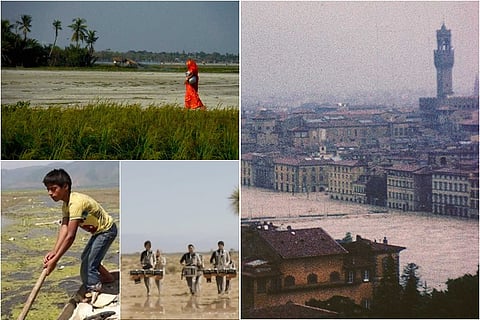

For some, water is more than just a resource. It’s a source of sustenance, a way of life. Civilisations grew around water sources and in many cultures, water is glorified, worshiped and revered. Its absence or excess is felt acutely and as the saying goes, water truly is the elixir of life.
For Chennai, the south Indian coastal city, water is an important and urgently discussed topic this summer. Just a few years ago too, water was all that people could talk about, but for a different reason. Then it was a question of excess water. Now, even as rain clouds loom above Chennai’s skies at long last, its water situation is still being debated across the world. ‘Will Chennai go down the Cape Town way?’ headlines read as sections of people are actively involved in cleaning dried and polluted lake and pond beds in time for the monsoons.
But just beneath this spotlight, this emergent crisis, lies a more pressing question, a larger question that will lead us to the bigger picture - ‘How do we, humans, look at nature?’.
At a screening in Chennai which was organised to emphasise the importance of water and the deepening crisis around the world, filmmaker and activist Amudhan Ramalingam Pushpam explains that the answer to this question will help us rethink our interaction with nature.
“We often think that nature owes us, humans. That it is present purely for our use and benefit. It isn’t,” he tells the group gathered for the screening.
“How we look at water? Protests, debates, news, memes on social media, are all important but we reduce it to a civic problem. Such screenings will remind us that it is a question of ethics. Will someone who speaks about conserving water today stand against mining or deforestation or even the destruction of oceans? We need to realise all of it is interrelated and stop seeking instant resolutions,” he says.
The screening was organised by Marupakkam, a media activist group run by filmmakers, activists and students. Curated by Georgekutty AL, Secretary of Bangalore Film Society and Founder Editor of Deep Focus Cinema, a scholarly film journal on Indian cinema, four films focusing mainly on inland water sources like lakes and rivers were screened at Discovery Book Palace, KK Nagar and Panuval Book Store, Thiruvanmiyur, on July 13 and 21 respectively.
First in line was Swimming in the Desert, a 2017 English language short film directed by Alvaro Ron, which is set in the drought-stricken town of Agua Dulce in California, USA, where a 10-year-old girl persuades her grandfather to execute an improbably and wacky idea to rejuvenate their river.
Next came Saving the Saviour, a 27-minute documentary by Kashmiri filmmaker Jalal Ud Din Baba. Jalal received two awards - Best Documentary Film and Best Film Direction - at the sixth National Science Film Festival and Competition-2016 (NSFF), organised by Vigyan Prasar, Ministry of Science and Technology, Government of India, for this documentary.
The documentary follows Billa, a teenage local boy who scavenges the Wular Lake in Bandipora district of Kashmir to hold his family together. Having lost his father at a very young age, Billa sells the plastic scraps and trash that he could fish out from the river to help his family. Saving the Saviour explores a very thin line of mutually beneficial survival for both Billa and the Wular.
The third film was Jholmolia - the Sacred Water, a 54-minute documentary by Bangladeshi filmmaker Saiful Wadud Helal. Jholmolia is a pristine pond in a small village, on the coastal belt of southwest Bangaladesh. Home to folklore of an entire world hidden beneath its surface, Jholmolia is considered a miracle by the locals, especially when it did not flood during the 2009 Cyclone Aila. Saiful, in his documentary, shot over a period of six years, captures the life of the villagers around the pond and speaks of returning again and again to the village, and exploring, as much as he could of Jholmolia’s alluring beauty.
What came last was Gianmarco D’Agostino's Camminando sull’acqua (Walking on Water), a film that hit closer home for the audience. The documentary is a piecing together of the 1966 Florence floods as seen through the eyes and creativity of Beppe Fantacci, the main man who is attributed to have saved the artisans of Florence after the floods. It featured 16 mm colour footage, interviews with Fantacci’s grand children, and memories shared by the survivors of the flood. Walking on Water reminded the small group at Discovery Book Palace of the Chennai floods from 2015 which was not unlike the floods of Florence.
Speaking about screening films on water, curator Georgekutty said, “The biblical 7-year drought was not human-made. But now, the floods and droughts are all human-made. Rivers are polluted and dried up and we need to recover them. I am organising such film festivals to raise awareness among people.”
Discussions post-screening ranged from government apathy and corporate greed to local politics. But Amudhan added that the intent of such screenings is to raise the larger question about nature itself.
Marupakkam will continue to organise film screenings based on themes every month at Discovery Book Palace and Panuval Book Store in Chennai. This package on films about water will be organised in schools and colleges based on request. Details on screenings and venue can be requested on 9940642044. For August, freedom-based films will be curated by Marupakkam.